Slovenský Kopov
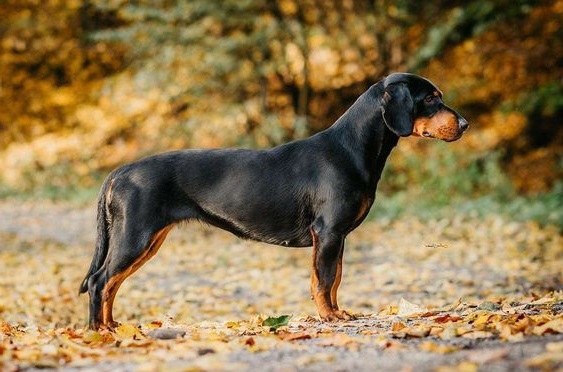
The Slovenský kopov is, first of all, a very loyal breed. It gets along very well with the whole family, but it chooses only one person as to its master. Even to children, this breed has a special affection, but we should not forget that acquaintance should come early. Many pets can provoke the innate instincts of the hound.
Table of Contents
Breed Information
| Another Name | Slovak Hound, Black Forest Hound |
| Origin | Slovakia |
| Height | Males 45-50 cm Females 40-45 cm |
| Weight | 15-20 kg |
| Fur | Thick |
| Color | Black and tan |
| Lifespan | 12-14 years |
| FCI Classification | Scent hounds and related breeds |
| Group | Hunting dogs |
| Price | $300 |
Breed Photos
Origin History
Judging by the name of the breed it is not difficult to guess that Slovakia is the hound’s home. The dog has its second name, Slovenský kopov, because “kopov” translates from Slovak as “hound”. The first information about the breed began to be kept only after the First World War, so it isn’t easy to assume the exact period of its origin. The Slovenský kopov was bred initially solely for hunting, not as a pet or exhibition breed. Nowadays, it can be found in the police as a bloodhound. The wild boar is the dog’s primary goal, thanks to its endurance and exceptional ability to follow a cold trail. Today, the Slovenský kopov can be found in Slovakia, with only tiny popularity in the United States and Russia.
Appearance
The Slovenský kopov has an elongated body. The torso is elongated in length, giving a deceptive sense of lightness. But in fact, the hound is strong, hardy, and agile. The chest is straight and broad. The back is straightforward, and the belly is taut. The muzzle has a pointed shape. The ears are small and floppy. The coat is short and tight to the body. The short limbs are very muscular.
Character
The Slovenský kopov is, first of all, a very loyal breed. It gets along very well with the whole family, but it chooses only one person as to its master. Even to children, this breed has a special affection, but we should not forget that acquaintance should come early. Many pets can provoke the innate instincts of the hound. Even as a puppy, the dog must learn rules that will limit his playful nature toward other pets. The mountainous terrain in which the breed originated has given the Cope courage, short stature, stamina, and determination.
Most breeds are wary and somewhat wary of strangers. Because of their keen hearing, any noise can cause the dog to bark loudly. It can alarm the neighbors, so this habit should be controlled from an early age.
The hound’s main activity is hunting, so it is better not to deprive the dog of this opportunity. However, long active walks can make up for the absence of this activity. The nature of the hound is characterized by independence. It is because of this that special attention should be paid to training. If the dog develops excellent obedience by the age of two, then the hound will work cohesively with its master during hunting. By teaching the dog to use its natural ability to excellent instinct, it will achieve good results.
Care
The care of the Slovenský kopov is minimally simple. It is enough to check the coat for parasites and dirt after every walk. It is obligatory to brush the coat several times a fortnight.
Mostly dirt and debris can accumulate on the ears, so they need special attention. Nails should preferably be trimmed every few months. Oral hygiene should not be neglected.
Training
The Slovenský kopov has a willful character, so you need to be as persistent as possible in training. Every successful action should be supported by praise and something tasty. If you teach the dog commands, it is necessary to achieve clear execution. Sometimes the cop may be engaged and start barking loudly, demanding a reward. This behavior should be stopped immediately when it comes to learning commands.
If the dog recognizes the leader in the master, then it will be easier to obey and learn. This point must not be missed at the very beginning of training.
Common Diseases
The Slovenský kopov has no special predisposition to the disease. The health of the dog is strong enough.
It is important to pay special attention to your dog’s eyes and ears. In case of injury, do not allow the infection to enter. Do not let your dog get too cold, as this can lead to respiratory problems.
The hound is susceptible to such diseases:
- dislocation of the kneecap;
- dysplasia of the knee joint;
- predisposition to conjunctivitis.
Nutrition
The dog is unpretentious in its diet. Meat should be in the diet every day. Soups and liquid porridge can be used. It is important to remember that drinking water should always be freely available to the dog. Feed the hound at a certain time every day, and in case of refusal, remove the food.
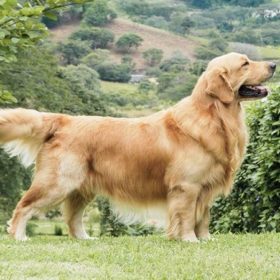 Golden Retriever
Golden Retriever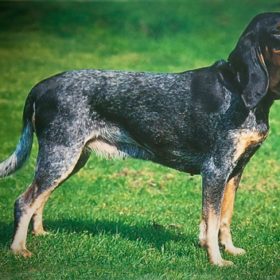 Small Lucerne Hound
Small Lucerne Hound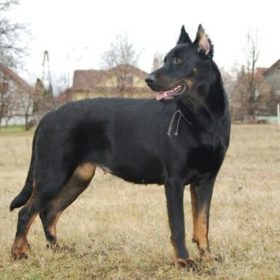 Beauceron
Beauceron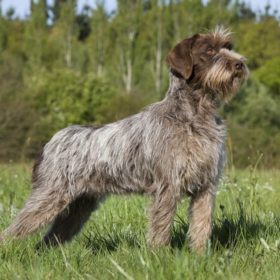 Wirehaired Pointing Griffon
Wirehaired Pointing Griffon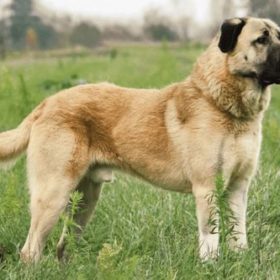 Kangal Shepherd Dog
Kangal Shepherd Dog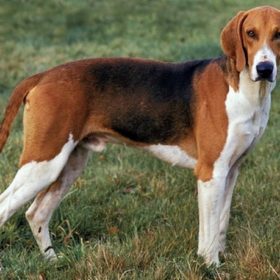 Poitevin
Poitevin